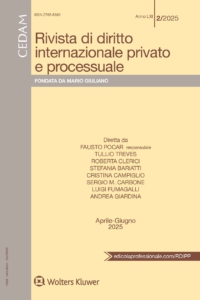Views
Virtual Workshop (in German) on November 12: Dennis Solomon on the foreign element in Private International Law and International Civil Procedure Law
On Tuesday, November 12, 2024, the Hamburg Max Planck Institute will host its monthly virtual workshop Current Research in Private International Law at 11:00-12:30 (CET). Prof. Dr. Dr. h.c. Dennis Solomon, LL.M. (Berkeley) (University of Passau) will speak, in German, about the topic
The foreign element in Private International Law and International Civil Procedure Law: same same, but different?
The presentation will be followed by open discussion. All are welcome. More information and sign-up here.
If you want to be invited to these events in the future, please write to veranstaltungen@mpipriv.de.
Children’s rights, private law and criminal law perspectives of parental child abduction
Written by Fanni Murányi, who will defend her PhD on Children’s rights, private law and criminological perspectives of parental child abduction at the Eötvös Loránd University (expected in 2024).
In this short summary of her research, Fanni highlights her conclusions on the role of the child’s views in abduction cases and the link between international child abduction and criminal law. She considered the legislative frameworks of the Hague Child Abduction Convention of 1980, the Brussels IIb Regulation (2019/1111) and the UN Convention on the Rights of the Child (UNCRC). She also investigated as well as the role of (domestic) criminal law. Read more
The Bahraini Supreme Court on Choice of Court Agreements, Bases of Jurisdiction and… Forum non Conveniens!
I. Introduction:
In a previous post on this blog, I reported a decision rendered by the Bahrain High Court in which the court refused to enforce a choice of court agreement in favour of English courts. The refusal was based on the grounds that the case was brought against a Bahraini defendant and that rules of international jurisdiction are mandatory. The Bahraini Supreme Court’s decision reported here is a subsequent development on the same case. The ruling is significant for many reasons. In a methodical manner, the Supreme Court identified the foundational justifications for the jurisdictional rules applied in Bahrain. Moreover, it clarified the role and effect of choice of court agreements, particularly their derogative effect. Finally, and somehow surprisingly, the Court supported its position by invoking to “the doctrine of forum non conveniens”, explicitly mentioned in its decision. Read more
News
Call for Papers: 4th APILA Conference, Doshisha University (Kyoto, Japan), 13–14 December 2025
The fourth annual APILA Conference will take place in person at Doshisha University in Kyoto (Japan) on Saturday 13 (Day 1) and Sunday 14 (Day 2) December 2025. The APILA Conference will be in the form of two days of roundtable discussions in English. Persons whose abstracts have been selected (see next paragraph) will deliver oral presentations in turn on Days 1 and 2. Each presentation will run for about 10 minutes and be followed by a discussion of about 10 to 15 minutes in which participants will have the opportunity to comment on the presentation. The objective of the APILA Conference is to assist presenters to refine prospective research papers with a view to eventual publication. Read more
Rivista di diritto internazionale privato e processuale (RDIPP) No 2/2025: Abstracts
 With a slight delay – entirely due to myself – I am pleased to announce the release of the second 2025 issue of the Rivista di diritto internazionale privato e processuale (RDIPP, published by CEDAM). This issue features:
With a slight delay – entirely due to myself – I am pleased to announce the release of the second 2025 issue of the Rivista di diritto internazionale privato e processuale (RDIPP, published by CEDAM). This issue features:
Francesco Pesce, Associate Professor at the University of Genoa, Il riconoscimento delle decisioni straniere in materia civile tra previsioni sulla competenza funzionale del giudice interno e comunicazioni alla Commissione europea (Recognition of Foreign Decisions in Civil Matters between Provisions on the Functional Jurisdiction of National Courts and Communications to the European Commission; in Italian) Read more
Virtual Workshop (in English) on September 2, 2025: Eva Lein on “PIL and dispute resolution in times of crisis”

On Tuesday, September 2, 2025, the Hamburg Max Planck Institute will host its monthly virtual workshop Current Research in Private International Law at 11:00 a.m. – 12:30 p.m. (CEST). Professor Eva Lein (Lausanne University) will speak, in English, about the topic
“PIL and dispute resolution in times of crisis”
In times of polycrisis, the law is put to the challenge. In international commercial transactions the question is how law can safeguard commercial activity, avoid a plethora of disputes, and encourage a pragmatic legal environment conducive to global economic recovery. This contribution discusses how dispute settlement mechanisms and private international law can be used to responsibly manage disputes in this context and to appropriately respond to future crises.
The presentation will be followed by open discussion. All are welcome. More information and sign-up here.
If you want to be invited to these events in the future, please write to veranstaltungen@mpipriv.de.




